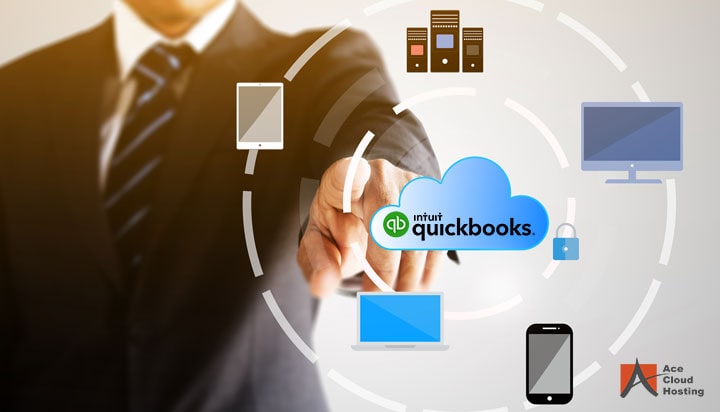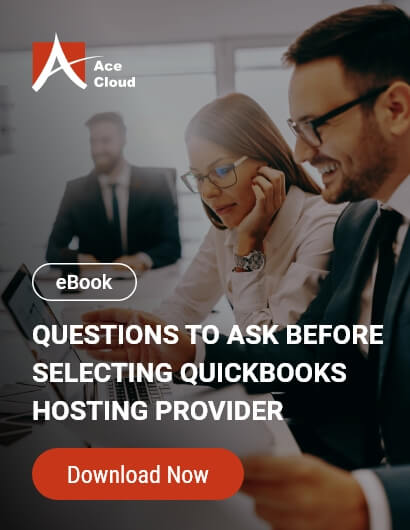QuickBooks on the cloud offer broader capabilities than traditional QB Desktop. It is remotely accessible from anywhere, anytime via a compatible device such as a smartphone, laptop, iPad, MacBook, etc. Furthermore, it offers real-time access to QuickBooks files, allowing you to make critical business decisions on the go.
However, before moving your QuickBooks to the cloud, several factors like organizational requirements, data center quality, security features, etc., should be considered. This will allow you to understand hosted QuickBooks and get the most out of it.
Here are the top ten factors to consider before moving your QuickBooks to the cloud:
1. Analyze your needs
QuickBooks on the cloud has the power to revolutionize your accounting experience. The question is, how will it cater to your needs? Are you planning to outsource your business operations? Are you shifting to remote working? These are some questions that you must ask yourself before hosting your QuickBooks.
Furthermore, consider your budgetary allocation. Analyze whether your current financial situation will be able to support your transition. Or will it be better to take things on a pilot basis first?
2. Decide on a deployment strategy
There are two ways by which you can host your QuickBooks. You can either do it yourself or hire a third-party service provider. The former calls for high capital expenditure with deep knowledge about hosting.
The latter is more straightforward and easily available at minimal expenses. So, before hosting your QuickBooks, analyze your organizational preferences. Decide whether you want to set up your cloud infrastructure or go with a QuickBooks Hosting Provider.
3. Use your pre-existing IT infrastructure
Multiple business owners have a different perspective about their IT infrastructure with QuickBooks. Some fear their existing resources will be rendered obsolete. In contrast, others prefer to renovate their IT infrastructure completely.
It is better to discuss using existing IT resources with your hosted QuickBooks solution provider. For instance, your office desktops can be easily configured to function as end devices.
4. Look at data center build
The building of data centers plays a vital role in determining your hosting experience. For this, Intuit has defined several essential features for the data centers being used. They must be at least tier-3 or above.
Furthermore, they must be highly redundant with N+1 parts availability. For instance, multiple power supply sources for continuous running of the data center. So, before you host your QuickBooks, ensure that such features are available with your service provider.
5. Do not compromise on uptime
Locally installed or hosted, QuickBooks is bound to face some downtime in any form. However, QuickBooks on the cloud proves to be a game-changer. You should avail yourself of hosting services from a top-rated QuickBooks Hosting Provider.
For uninterrupted business operations, move QB to only those hosted platforms with high uptime availability. A reputed hosting vendor offers at least 99.99% uptime availability. Also, if you opt for cloud services from Ace Cloud Hosting, we offer uninterrupted and SLA-backed 99.99% uptime.
6. Know your data security responsibilities
Getting QuickBooks hosting from a renowned hosting provider offers various top-quality security features. However, this doesn’t mean that entire responsibilities fall upon their shoulders. You also play an active role in maintaining your data security.
Before you move your QuickBooks to the cloud, you should discuss security responsibilities with them. It will give you a clear idea of your role and how you contribute to overall data security. This way, you can better protect your QuickBooks data and secure it from being breached.
7. Adhere to compliances
Regulatory compliance adherence ensures necessary business practices are followed within an organization. This helps you achieve high-quality standards, improve your operational efficiency, and build a positive market reputation. Similarly, CPAs and accounting firms must follow several regulatory compliances like SOX, GAAP, SEC, etc.
Before moving to the cloud, ensure your business objectives are fulfilled, and you can follow them. Furthermore, avail services from only those providers that adhere to cloud compliances like SSAE-16, ISO/IEC 19941:2017, ISO/IEC 19086-1:2016, etc.
8. Request for a demo session
Migrating to the cloud may prove challenging for your employees. Just remember the last time you bought a new appliance and had your head-scratching over its manual! So, before you embrace QuickBooks on the cloud, it is better to go for a demo session.
This will allow your employees to understand how hosted QuickBooks will help their daily operations. Moreover, they can quickly clear any confusion and be more comfortable with the solution.
9. Check internet connectivity
On-premise QuickBooks is locally-installed and doesn’t require internet connectivity to operate. In contrast, QuickBooks on the cloud cannot be operated without a proper internet connection.
The end-user experience greatly depends upon your network strength. So, before you opt for hosted QuickBooks, make sure to contact your internet provider first. Communicate your needs and ensure they provide the necessary bandwidth.
10. Disaster recovery is a must
Cloud-based storage holds much more credibility than locally-based storage. This is because the data is regularly backed on multiple servers. These servers are geographically isolated for easy data recovery in case of disasters.
So before investing, ensure your hosting provider has multiple servers across different locations. Also, enquire about the recovery time and backup frequency. So, whenever any disaster occurs, you can quickly continue the recovery of your QuickBooks Data without any delay.
Ready to start your journey to the cloud?
Moving your QuickBooks to the cloud means that you partner with an expert QuickBooks hosting provider. This ensures that you get quality services from a provider who is compliant with industry regulations.
You can rely on us for your QuickBooks Hosting needs. Get in touch with our Solutions Consultant to get a 10-day free trial.










